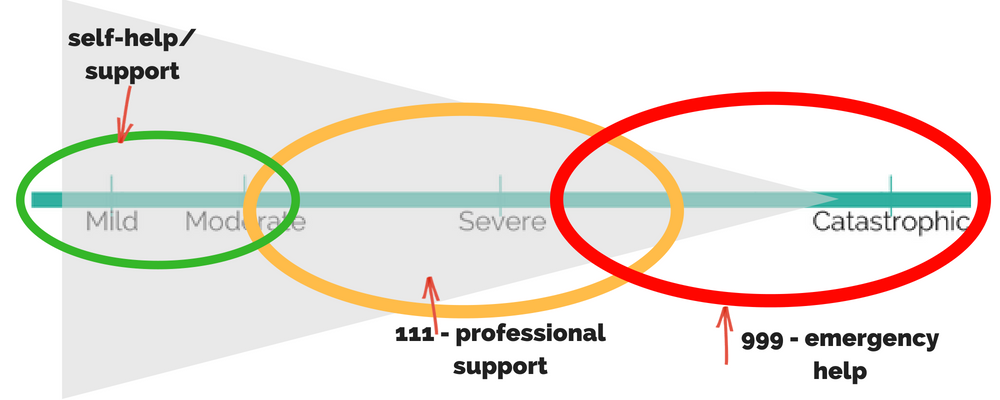Male Mid-life Crisis - what action should I take?
In Crisis? What are my options?
In my last blog, I introduced my ‘mid-life crisis continuum’ in an effort to highlight the fact that much of what we label as ‘mid-life crisis’ often isn’t anything like a crisis. However...
If we are not aware, equipped and willing to confront some of the very human feelings, thoughts and questions that arise at the 'moderate' end of the continuum, we could find ourselves in trouble. It is important to recognise (and that’s why I see this as a continuum), that we can slip, stumble or plough headlong into the crisis end (severe and catastrophic on the continuum).
The ‘mid-life crisis continuum'
In today's blog, using the continuum, I want to create a bit of a visual to illustrate the appropriate interventions one can undertake at a given stage. In effect, I want to emphasise the value positive self-development can have in helping us positively navigate our way through what we often mis-label as 'crisis.' I also want to address the limits of self-help and development. It really does concern me that many promote 'self-help' as the salve for all ills. It isn't. It has its limits. And we must be open to considering other avenues of support and aid.
As can be seen from the image above - the significance and impact of the thoughts, feelings, questions and so forth increase. What I think is worth emphasising here, before looking at options available to us at any given point on the continuum, is the fact that as we progress along the continuum in the direction of increasing severity, our range of options reduce. The milder the so-called' crisis, the more choices and options we have. The image below illustrates this:
Illustration: Reducing range of options as severity increases along the continuum
A place for Self-development?
The following illustration develops this concept, but for now, as with so many things in life, the more significant the impact of our thoughts, feelings and questions, the fewer become the choices available to us. For those further down the continuum, then the options do increase. With that in mind, the following illustration is an indication of where I see 'self-development' in playing its part on the continuum.
The place for self-development and self-help in managing the so called ‘mid-life crisis'
Down at the ‘mild’ to ‘moderate’ end, one is likely to have time to try things out, explore a range of self-help options, and generally engage in positive low level self-help, and support seeking. As one moves along the continuum, then time may become a factor, as any behaviour manifesting may well start to press itself upon your life. For example, gambling, over drinking, indulging in an affair. Options do narrow, and you may need to consider more significant action and act more promptly too. I have used the UK '111' and '999' labels to be a useful handle for seeking professional support ('111' - being counsellor, therapist, GP (or Doctor), Relate, and so on) or requiring emergency help ('999' - being emergency services police, ambulance, Mental Health Crisis Team intervention, but also includes significant support in the event of financial or relationship crisis).
In coming blogs, I will explore options and what we can do to support ourselves in the ‘mild’ to ‘moderate’ end of the continuum. Some of these may be helpful if you find yourself towards the more severe end of the continuum, but, and this is vital to understand, your need for seeking professional support and the help of your loved ones, coupled with a willingness to be honest and open becomes more and more important.
A true ‘crisis’ in that sense, is one which none of us should ever, and need ever, experience alone.
At time of real Crisis?
And that action? Simply speak up. Get in touch with at least one loved one and tell them. Tell them any way, anyhow, but tell them you need help.
Then, get in touch with some professional support. These range from contacting your GP for an urgent appointment (if out of hours, your non-emergency medical support in the UK that’s the 111 number, or if in an emergency situation, ie you are in imminent danger of doing something catastrophic to yourself or another, then in the UK 999 and ask for help).
You can contact other support like the Samaritans, or check out the other resources available through the NHS and charities such as Mind.
In the next blog, I will explore what self-help really means and how this can assist us in positively navigating our way through the mild end of the continuum. And, I want to start to recognise this end of the continuum as what it really is - not a crisis at all, but more the stuff that comes with being a human being.
Keep an eye out for the next blog.
Dave Algeo
Motivational Speaker on resilience and men's mental health.
Daily Sprouts by Email?
Want a regular reminder to focus on you and your wellbeing? Then why not sign-up and receive my daily sprout videos every Monday, Wednesday and Friday direct to your inbox? (They are only 30-45 seconds long - 1min max).
As a word of advice for any one experiencing their own sense of desperation, loss or crisis, please, don't endure it alone. Seek help. From family, trusted friends and professionals. Your own Doctor or GP is a great place to start. Or there are great services provided by organisations such as the Samaritans. For further advice on professional support and advice check out the NHS resources.
This series of blogs is intended to encourage reflection on your own wellbeing and mental health. It seeks to encourage you to speak up and get help where needed and take hope that you things can be better. It is not intended as therapy or a replacement for professional help and advice.




